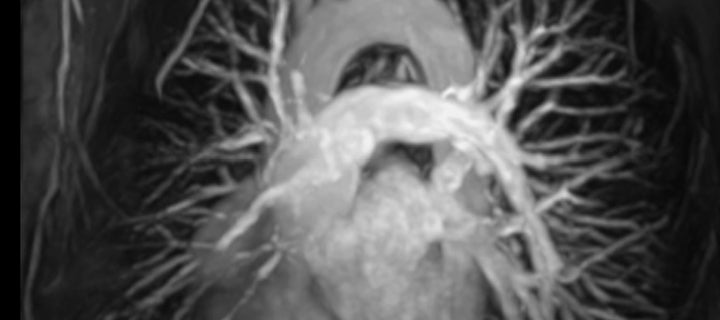Cardiac MRI
Cardiac MRI

Cardiovascular magnetic resonance imaging, also known as cardiac MRI, is increasingly being used for non-invasive assessment of the function and structure of the cardiovascular system.
Conventional MRI sequences are adapted for cardiac imaging by using ECG gating and high temporal resolution protocols.
Cardiac MRI provides specific advantages over other cardiac imaging modalities when evaluating pathology in congenital heart disease, cardiac masses, cardiomyopathies, and in some aspects of ischaemic and valvular heart diseases. The strength of cardiac MRI in these pathologies includes its precise anatomical delineation of structures, characterisation of myocardial tissue, and accurate, reproducible measurements of blood volume and flow. Cardiac MRI is used in inpatient and outpatient settings, and is available primarily in major hospitals and some I-MED clinics.
What are the advantages of cardiac MRI?
- Improved image quality
- No ionising radiation
- Accurate ejection fraction measurement
- Investigation for suspected myocarditis that cannot be confirmed on echocardiography
- Assessment of newly diagnosed cardiomyopathy with diagnostic and prognostic advantages over echocardiography
- Assessment of myocardial viability and perfusion in work-up for coronary artery bypass surgery
- Assessment of congenital heart disease
Disadvantages
- Cost and accessibility
- Contraindicated in patients with metallic implants (e.g. aneurysm clips, neurostimulators, implanted pacemakers/defibrillators), metal retained fragments in eyes or gunshot injuries
- May be unsuitable for patients with claustrophobia
- A specific cut-off weight for patients varies among individual MRI scanners. Large abdominal and shoulder girths may limit the physical ability of patients to fit in an MRI scanner
- Gadolinium is contraindicated in significant renal disease (eGFR <30 mL/minute)
Indications for cardiac MRI
The following, although not exhaustive, are a guide to the indications for Cardiac/Thoracic MRI
- Cardiomyopathys and Cardiac function – true volumetric assessment of LV and RV volumes and EFs
- Infarction and myocardial viability – detailed assessment of the extent of scar and thickness of infarct within the wall of each segment. Aids in therapeutic considerations and decision to vascularise.
- Infiltration and fibrosis – eg cardiac sarcoidosis, Churg strauss, Wegeners, etc
- Myocarditis/pericarditis– including constrictive pericarditis.
- Valvular heart disease – severity of regurgitation or stenosis and associated cardiomyopathy. Including Pre and Post TAVI assessment.
- Amyloidosis
- Myocardial and hepatic iron loading quantification
- Cardiac thrombus and primary cardiac masses or metastases.
- Congenital heart disease
- Shunt quantification – ASD, VSD and PFO.
- Coarctation of the aorta – including assessment of flow and reversal of flow before and after the stenosis.
- Cardiac assessment in the setting of non-diagnostic or equivocal echocardiography
Is there any special preparation required for Cardiac MRI?
There is no special preparation for this examination. However, it is important to advise us
- if your patient has:
- a pacemaker;
- a cerebral aneurysm clips or a surgically implanted medical device or implant;
- if it is possible that the patient is pregnant; or
- the patient has a history of working with metal
All patients will be asked to complete an MRI safety questionnaire and the patient will be asked to change into a gown as clothing may have metallic components which can interfere with the MRI images.
The procedure usually takes 30-45 minutes to complete.
Need more help?
If you have any questions or enquiries regarding our cardiac imaging services, please contact your local I-MED Radiology clinic or your Account Manager.
Download the cardiac MRI information sheet here.
